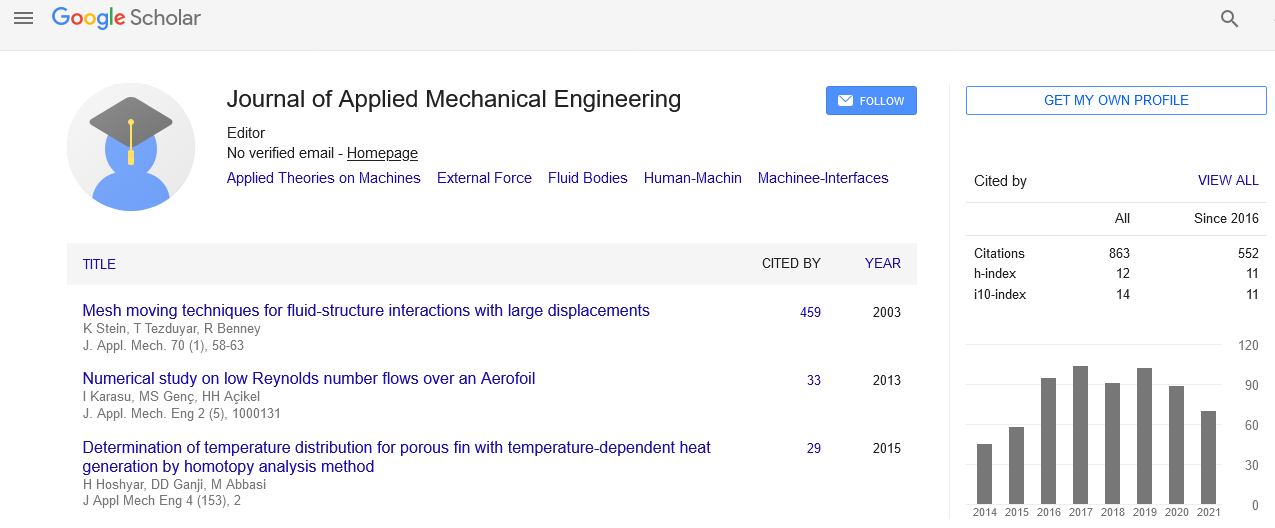Indexed In
- Genamics JournalSeek
- JournalTOCs
- CiteFactor
- RefSeek
- Hamdard University
- EBSCO A-Z
- OCLC- WorldCat
- Publons
- Google Scholar
Useful Links
Share This Page
Journal Flyer

Open Access Journals
- Agri and Aquaculture
- Biochemistry
- Bioinformatics & Systems Biology
- Business & Management
- Chemistry
- Clinical Sciences
- Engineering
- Food & Nutrition
- General Science
- Genetics & Molecular Biology
- Immunology & Microbiology
- Medical Sciences
- Neuroscience & Psychology
- Nursing & Health Care
- Pharmaceutical Sciences
Shifting product design from technology driven to user centre design
Joint Event on 2nd International Conference on Advanced Robotics, Mechatronics and Artificial Intelligence & 3rd International Conference on Design & Production Engineering
December 03-04, 2018 | Valencia, Spain
Fang Bin Guo
Liverpool John Moores University, UK
Scientific Tracks Abstracts: J Appl Mech Eng
Abstract:
Traditional industrial design is about functions and forms. Designers placed great emphasis on forms and aesthetics. However, technology innovation has shifted industrial design from the stage of technology driven to user centered design driven, this is also due to the functions of products are increasingly complex to interact, i.e. electrical/computers devices, mobile phones and multifunctional products. So that industrial design now emphasizes on bettering user experience. Don Norman defines user centered design as all aspects of the person???s experience with the system including the interface, the physical interaction and the manual. Technology revolution results in products are getting more complex, in particular those of multimodality interfaces include car dashboard and aircraft cockpits that displayed a number of information such as engine temperature, fuels level, speed etc. That challenges the user to recognize/understand the information. Human factor is the scientific discipline that concerned with the understanding of the interactions among humans and other elements of a system. The knowledge, in particular product semantics is a language that helps people to understand and interact with products easily and efficiently. Designers rely on this language to communicate with users; to express functions, reliabilities and characters through forms, material/textures and semiotics. This paper discusses user centered design and human factors knowledge, in particular product semantics and its application in product design; and reviewing a curriculum developed particularly focuses on user centered design within a BSc product design engineering programme. Recent Publications 1. Guo F B (2017) Capturing Imagination: A Shift from Teaching to Learning. ICERI 2017 Proceedings. 10th international conference of education, research and innovation, Seville, November 2017. 2. Guo F B (2016) Switching from lectures to design workshop. INTED 2016 Proceedings. 10th international technology education and development conference, Valencia, March 2016. 3. Guo F B (2015) Educating Design Professionals in the 21st Century.17th International Conference on Engineering and product Design Education, Loughborough University, September 2015. 4. Guo F B (2015) Aligning teaching and learning approach and assessment method to enhance the quality of higher design education. INTED 2015 Proceedings. 9th international technology education and development conference, Madrid, March 2015. 5. Guo F B (2011) Industrial Design Education. ISBN-13: 9783844383256. Publisher: LAP Lambert Academic Publishing.
Biography :
Fang Bin Guo has been a Senior Industrial Designer and worked for a variety of design consultancies/in-house design teams before teaching product design engineering at Liverpool John Moores University (UK). He holds BA, MSc and PhD degrees in the field of industrial design and remains actively involved in academic research in terms of identifications of the economic condition, cultural issues, expectations of industry, the current role of design/designer, especially clarifying pedagogical trends and curriculum development. His current researches incorporate Human Factors issue and its applications in product design/development, in particular in the context of contemporary industry and further the impact on design and design education.
E-mail: f.b.guo@ljmu.ac.uk

